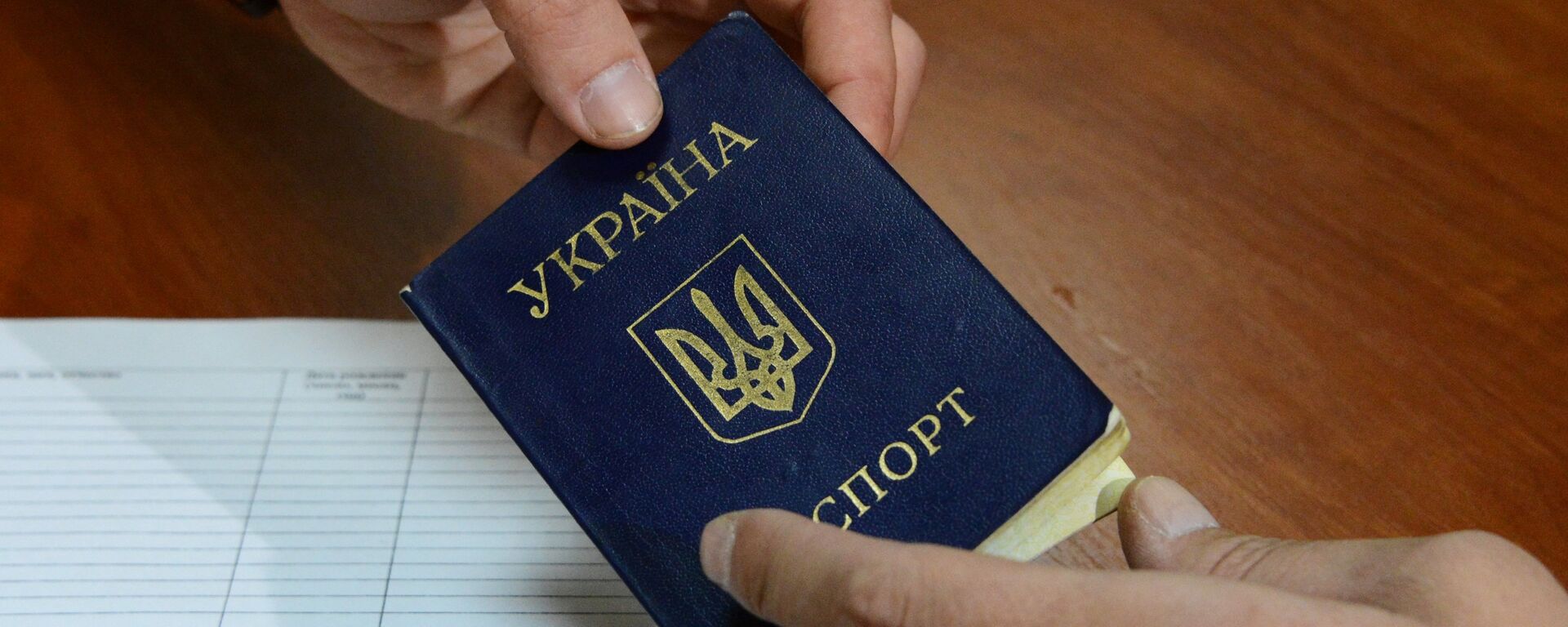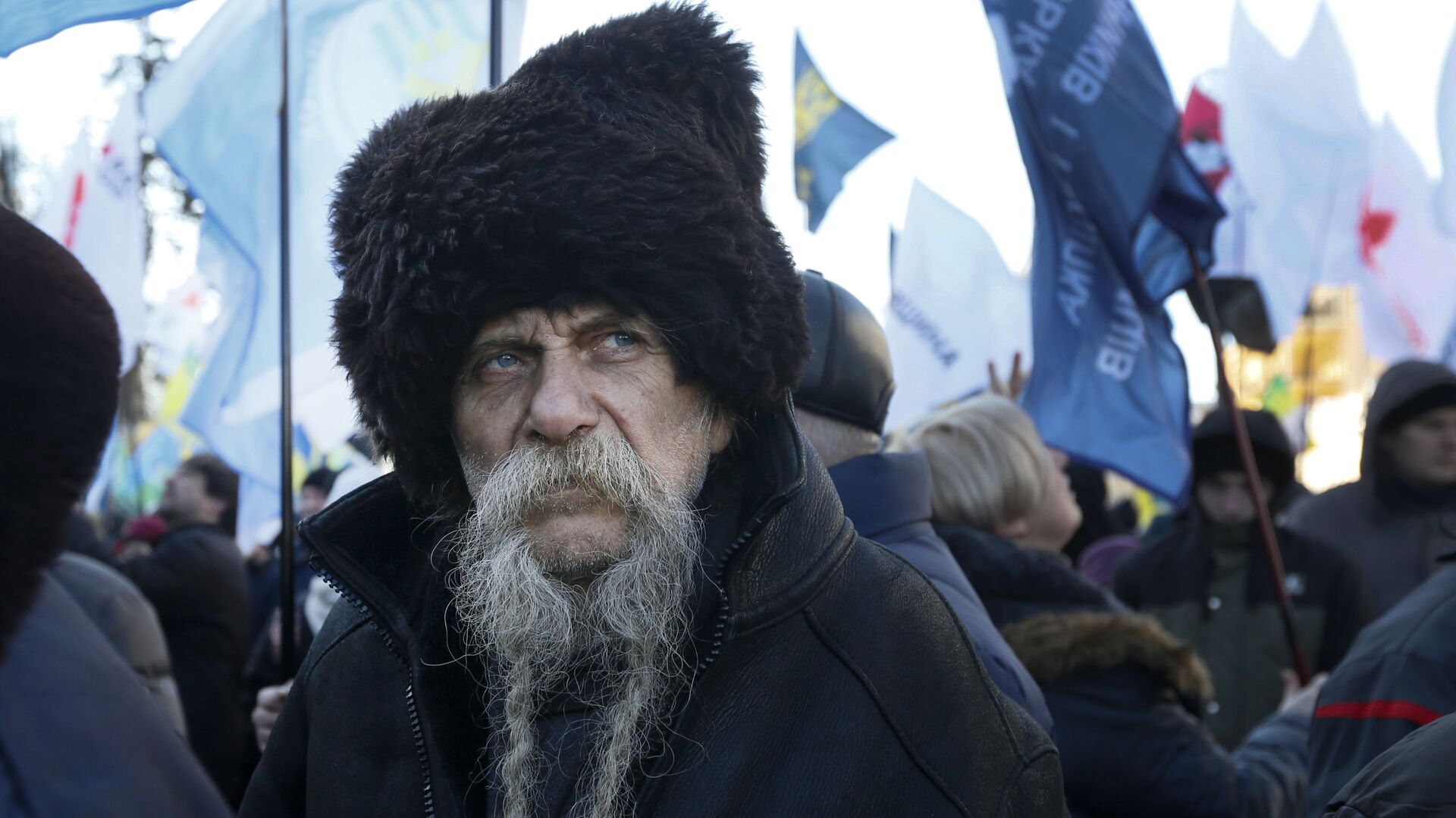https://sputnikglobe.com/20231219/why-zelensky-aides-plan-b-economics-will-be-a-dictatorship-imposition-of-property-1115682195.html
Why Zelensky Aide's 'Plan B' Economics Will Be a 'Dictatorship Imposition of Property'
Why Zelensky Aide's 'Plan B' Economics Will Be a 'Dictatorship Imposition of Property'
Sputnik International
If the West stops funding Ukraine, Kiev may resort to a plan B, economist and adviser to Ukrainian President Volodymyr Zelensky, Oleg Ustenko, has claimed. So what's behind this plan?
2023-12-19T15:35+0000
2023-12-19T15:35+0000
2023-12-19T15:35+0000
analysis
russia
ukraine
volodymyr zelensky
kiev
business
national bank of ukraine
https://cdn1.img.sputnikglobe.com/img/107825/22/1078252251_0:66:2886:1689_1920x0_80_0_0_75f456e4ba9253bee78ae191f8238c90.jpg
"Plan B may be a multi-level one, but I believe that at the first stage it will be enough to turn to the domestic market to borrow capital and obtain funds on the domestic market," Ustenko said.The advisor to Zelensky believes that the authorities will be able to "resolve the situation throughout January" and that "there will be money.""The country’s savings of the private sector, that is, firms and households, will thus be borrowed by the government, which increases its own debt thereby. If these savings are not enough in this regard, the government might also sell its bonds to the banking sector, as banks can lend without borrowing, in light of the principle that bank loans create deposits (…). In short, the government will be able to cover Ukraine’s needs in any case, provided that domestic banks are willing to buy the necessary amount of government bonds in this regard."Rossi specified that the effectiveness of Ustenko's plan depends on "the banks' willingness to buy government bonds up to the amount required by the government to finance its own deficits, resulting from this plan eventually."The professor went on to say that if no foreign aid is available in the foreseeable future, the Ukrainian government "might seize a relevant share of these savings, thereby obliging wealthy people to finance the public sector’s debt, without any compensation since in this case no interest payment would occur."This would also give a terrible signal both to the country's rich and the whole Ukrainian population in general, according to Rossi: "It would be a dictatorship imposition, in an undemocratic regime that could induce a series of social riots and revolutions over the long run," he warned.The Kiev regime has found itself between a rock and a hard place as US lawmakers left Capitol Hill for their winter break without passing the $61 billion Ukraine package. At the same time, on the other side of the pond, Hungarian Prime Minister Viktor Orban vetoed the allocation of €50 billion for Ukraine through 2027.Even though the issue will be considered again in January, the Western mainstream press has openly admitted that Ukraine fatigue is gaining pace.
https://sputnikglobe.com/20231219/over-70-of-ukrainians-ready-to-renounce-citizenship-to-avoid-military-service---poll-1115673200.html
https://sputnikglobe.com/20231216/zelenskys-in-trouble-ukraine-being-used-as-sacrificial-lamb-for-us-interests--1115615600.html
russia
ukraine
kiev
Sputnik International
feedback@sputniknews.com
+74956456601
MIA „Rossiya Segodnya“
2023
Sputnik International
feedback@sputniknews.com
+74956456601
MIA „Rossiya Segodnya“
News
en_EN
Sputnik International
feedback@sputniknews.com
+74956456601
MIA „Rossiya Segodnya“
Sputnik International
feedback@sputniknews.com
+74956456601
MIA „Rossiya Segodnya“
ukrainian economy how corrupt is ukraine, is ukraine a liberal country, is ukraine bankrupt, how much does us spend on ukraine, ukraine aid statistics
ukrainian economy how corrupt is ukraine, is ukraine a liberal country, is ukraine bankrupt, how much does us spend on ukraine, ukraine aid statistics
Why Zelensky Aide's 'Plan B' Economics Will Be a 'Dictatorship Imposition of Property'
If the West stops funding Ukraine, Kiev may resort to a plan B, economist and adviser to Ukrainian President Volodymyr Zelensky, Oleg Ustenko, has claimed. So what's behind this plan?
"Plan B may be a multi-level one, but I believe that at the first stage it will be enough to turn to the domestic market to borrow capital and obtain funds on the domestic market," Ustenko said.
The advisor to Zelensky believes that the authorities will be able to "resolve the situation throughout January" and that
"there will be money.""This borrowing mechanism means that Ukraine will issue government bonds to finance its public deficit," Sergio Rossi, a professor of macro and monetary economics at the University of Fribourg, Switzerland, told Sputnik.
"The country’s savings of the private sector, that is, firms and households, will thus be borrowed by the government, which increases its own debt thereby. If these savings are not enough in this regard, the government might also sell its bonds to the banking sector, as banks can lend without borrowing, in light of the principle that bank loans create deposits (…). In short, the government will be able to
cover Ukraine’s needs in any case, provided that domestic banks are willing to buy the necessary amount of government bonds in this regard."

19 December 2023, 00:59 GMT
Rossi specified that the effectiveness of Ustenko's plan depends on "the banks' willingness to buy government bonds up to the amount required by the government to finance its own deficits, resulting from this plan eventually."
"If commercial banks are unwilling to finance the public sector’s deficits in this way, the national central bank might do so, but only if the law on the National Bank of Ukraine is modified to allow it," continued the expert. "Otherwise, the government might oblige commercial banks across the country to purchase its own bonds, but this would give a very bad signal to these financial institutions, which could also react in different ways that could damage the whole economic system."
The professor went on to say that if no foreign aid is available in the foreseeable future, the Ukrainian government "might seize a relevant share of these savings, thereby obliging wealthy people to finance the public sector’s debt, without any compensation since in this case no interest payment would occur."
This would also give a terrible signal both to the country's rich and the whole Ukrainian population in general, according to Rossi: "It would be a dictatorship imposition, in an undemocratic regime that could induce a series of social riots and revolutions over the long run," he warned.

16 December 2023, 02:45 GMT
The Kiev regime has found itself between a rock and a hard place as US lawmakers left Capitol Hill for their winter break without passing the $61 billion Ukraine package. At the same time, on the other side of the pond, Hungarian Prime Minister Viktor Orban vetoed the allocation of €50 billion for Ukraine through 2027.
Even though the issue will be considered again in January, the Western mainstream press has openly admitted that Ukraine fatigue is gaining pace.




